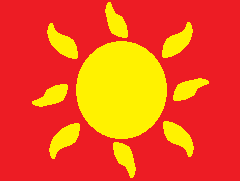Lien Ji Province (Ilarion Environment)
| Capital | |
| X (Pathfinder Environment) | |
| Government | |
| X | |
| Leaders | |
| X | |
| Deities | |
| Jin Feng, Yin Tuzi | |
| Language | |
| Population | |
| 22,209,000 | |
| Diversity | |
Lien Ji houses the capital and is considered the center of the Empire.
The people of Lien Ji are highly bureaucratic and value a good education.
Commoners have to work for the government for one month every year; typically they serve in military or work on construction projects.
Geography[edit]
The Area[edit]
Geographical Features[edit]
Cities[edit]
X (Pronouce)
Government[edit]
Foreign Relations[edit]
Military[edit]
X has a standing army of X,000 soldiers – mostly infantry and cavalry – and a reserve pool nearing X,000 persons in times of emergencies.
Law[edit]
Trial Procedure[edit]
Crimes and Punishments[edit]
Arson:
Assault:
Forgery:
False testimony:
Kidnapping or unlawful detainment:
Murder:
Rape:
Slave revolt:
Theft:
Treason:
Unlawful assembly:
Unlawful use of magic or use of arcane magic:
Banishment:
Crucifixion:
Execution:
Fines:
Incarceration:
Physical Labor:
Public flogging:
Slavery[edit]
History[edit]
Society[edit]
Mannerisms and Customs[edit]
Greetings[edit]
Superstitions[edit]
Sexism[edit]
E
Marriage and Family[edit]
Clothing[edit]
Architecture[edit]
Art[edit]
Entertainment[edit]
Games[edit]
Gambling[edit]
Festivals[edit]
Common Festivals[edit]
Illness, Death and the Pyre[edit]
Sickness and Medicine[edit]
Ageing[edit]
Education[edit]
Cuisine[edit]
Meat:
Dairy products:
Herbs and spices:
Grains:
Legumes:
Vegetables:
Fruits:
Nuts:
Greens:
Dressings and sauces:
Commerce[edit]
Imports:
Exports:
Currency:
Taxation:
Traits[edit]
The following are regional traits for X:
Gear[edit]
The following is a list of gear commonly available in X:
Weapons:
Armor:
Adventure Gear:
Regions[edit]
Cities[edit]
Sexism[edit]
Marriage and Family[edit]
In Lien Ji, marriages are arranged through a matchmaker, who will often use numerology to determine a match and the wedding date. The young couple traditionally does not meet until the wedding day. The groom’s family presents prolific gifts to the bride’s family, symbolizing respect and kindness towards them, as well as the capability of providing a good life for the girl. A dowry, often representing land or other property, is sent to the groom ahead of the bride.
The wedding ceremony begins with the groom overcoming a series of difficulties to retrieve the bride from her home. The bride, dressed in bright festive colors, must cry with her mother to show her reluctance to leave home before being led or carried by her eldest brother to the groom’s carriage.
At the temple, the bride is led along a red carpet in a festive atmosphere while the groom kowtows to the gods, the parents and her. Then the new couple goes to their bridal chamber and guests are treated to a feast. On the third day of the marriage, the new couple returns to the bride's parents' home to stay before going to their permanent home (either with his family or on the property from her dowry).
Architecture[edit]
Lien Ji architecture is mainly timberwork, with many carvings and painted murals. Archways tend to be rounded or Circular and interior walls serve as the separation of rooms without bearing any weight. Large buildings are laid out symmetrically around a central court yard with less important structures running along the north/south axis.
Clothing[edit]
Cuisine[edit]
Tofu and soy milk are main sources of protein for the common folk. For the wealthy it is pork. Meat is typically reserved for special occasions. Most dishes are served with wheat based bread or noodles. Soups are quite common and a good broth is considered the height cuisine. There is a wide variety of seafood and vegetables, especially along the coasts.
Meat:
Dairy products:
Herbs and spices:
Grains:
Legumes:
Vegetables:
Fruits:
Nuts:
Greens:
Dressings and sauces:
Breakfast[edit]
Lunch[edit]
Dinner[edit]
Desserts[edit]
Snacks[edit]
Beverages[edit]
Defense[edit]
Commerce[edit]
Imports:
Exports:
Currency:
Taxation:
Slavery[edit]
Over the course of 100 years and the reign of three emperors, slavery was outlawed in Lien Ji, and in fact the whole of the empire.
Traits[edit]
Gear[edit]
Back to Main Page → Pathfinder Homebrew → Campaign Settings → Ilarion → Nations → The Dao Ming Empire
